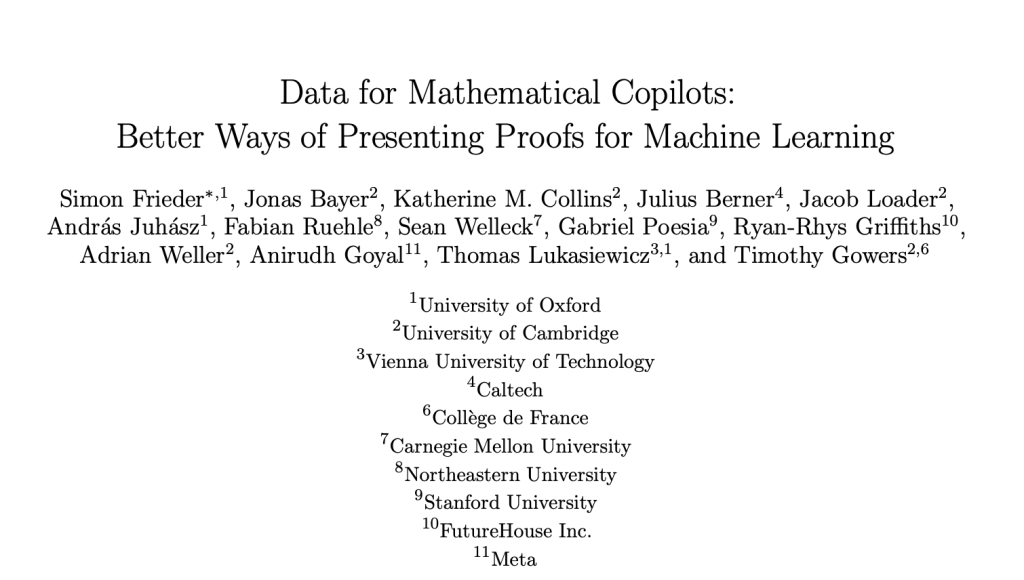

Current datasets used to train and evaluate AI-based mathematical assistants, particularly LLMs, are limited in scope and design. They often focus on undergraduate-level mathematics and rely on binary rating protocols, making them unsuitable for evaluating complex proof-based reasoning comprehensively. These datasets lack representation of critical aspects of mathematical workflows, such as intermediate steps and problem-solving strategies essential in mathematical research. To overcome these limitations, there is a pressing need to redesign datasets to include elements like “motivated proofs,” which emphasize reasoning processes over results, and workflows that capture the nuanced tasks involved in mathematical discovery.
Recent advancements in AI for mathematics, such as AlphaGeometry and Numina, have successfully solved Olympiad-level problems and converted mathematical queries into executable code. However, the proliferation of benchmarks, such as GSM8K and MATH, has led to over-reliance on a few datasets while neglecting advanced mathematics and practical workflows. While highly specialized models excel in narrow domains requiring formal language input, general-purpose models like LLMs aim to assist mathematicians broadly through natural language interaction and tool integration. Despite their progress, these systems face challenges such as dataset contamination and lack of alignment with real-world mathematical practices, highlighting the need for more comprehensive evaluation methods and training data.
Researchers from institutions like Oxford, Cambridge, Caltech, and Meta emphasize improving LLMs to serve as effective “mathematical copilots.” Current datasets, such as GSM8K and MATH, fall short of capturing the nuanced workflows and motivations central to mathematical research. The authors advocate for a shift towards datasets reflecting practical mathematical tasks inspired by concepts like Pólya’s “motivated proof.” They propose integrating symbolic tools and specialized LLM modules to enhance reasoning alongside developing universal models for theorem discovery. The study underscores the importance of datasets tailored to mathematicians’ needs to guide the development of more capable AI systems.
While not specifically designed for mathematics, current general-purpose LLMs have demonstrated strong capabilities in solving complex problems and generating mathematical text. GPT-4, for example, performs well on undergraduate-level math problems, and Google’s Math-Specialized Gemini 1.5 Pro has achieved over 90% accuracy on the MATH dataset. Despite these advancements, concerns exist regarding the reproducibility of results, as datasets may be contaminated or not properly tested, potentially affecting generalization to diverse problem types. Specialized models like MathPrompter and MathVista perform well in arithmetic and geometry but are limited by the narrow focus of available datasets, often omitting advanced reasoning tasks.
The study highlights how current datasets fail to support AI models in addressing the full spectrum of mathematical research, particularly in tasks like conjecture generation and proof strategies. Existing datasets primarily focus on question-answering or theorem proving without evaluating the intermediate reasoning process or workflows mathematicians follow. Many formal datasets lack problem complexity, suffer from tool misalignment, or face data duplication issues. To overcome these challenges, the paper advocates for developing new datasets encompassing a wide range of mathematical research activities, such as literature search and proof formulation, along with a comprehensive taxonomy of workflows to guide future model development.
In conclusion, The study discusses AI’s challenges in becoming a true mathematical partner, similar to GitHub Copilot for programmers. It highlights the complementary nature of natural and formal language datasets, noting that what is easy in one representation may be difficult in the other. The authors emphasize the need for better datasets that capture mathematical workflows, intermediate steps, and the ability to assess proof techniques. They argue for developing datasets beyond proofs and results to include reasoning, heuristics, and summarization, which will aid AI in accelerating mathematical discovery and supporting other scientific disciplines.
Check out the Paper. All credit for this research goes to the researchers of this project. Also, don’t forget to follow us on Twitter and join our Telegram Channel and LinkedIn Group. Don’t Forget to join our 60k+ ML SubReddit.
The post Redesigning Datasets for AI-Driven Mathematical Discovery: Overcoming Current Limitations and Enhancing Workflow Representation appeared first on MarkTechPost.
Source: Read MoreÂ



 Trending: LG AI Research Releases EXAONE 3.5: Three Open-Source Bilingual Frontier AI-level Models Delivering Unmatched Instruction Following and Long Context Understanding for Global Leadership in Generative AI Excellence….
Trending: LG AI Research Releases EXAONE 3.5: Three Open-Source Bilingual Frontier AI-level Models Delivering Unmatched Instruction Following and Long Context Understanding for Global Leadership in Generative AI Excellence….